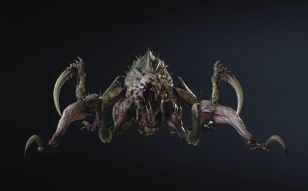Difference between revisions of "Drain Deimos"
Hobbes 182 (talk | contribs) |
Hobbes 182 (talk | contribs) |
||
| Line 12: | Line 12: | ||
organs and muscles appearing in odd and unnatural places, | organs and muscles appearing in odd and unnatural places, | ||
due to their extremely quick growth. | due to their extremely quick growth. | ||
| + | |||
Drain Deimos get their nutrition from the cerebrospinal fluid | Drain Deimos get their nutrition from the cerebrospinal fluid | ||
| Line 19: | Line 20: | ||
and lay eggs, beginning the cycle of self- | and lay eggs, beginning the cycle of self- | ||
reproduction. | reproduction. | ||
| + | |||
They generally like to stay in places that | They generally like to stay in places that | ||
| Line 29: | Line 31: | ||
the consequences, using their claws and fangs | the consequences, using their claws and fangs | ||
against their prey. | against their prey. | ||
| + | |||
[[File:Null icon2.png|300px]] | [[File:Null icon2.png|300px]] | ||
Revision as of 15:07, 13 May 2022
Information
Irregular mutants with the nickname DD. It's believed that the Drain Deimos were originally fleas that ate the flesh of an animal infected with the T-Virus. They grew to hundreds of times their original size, about as big as an average-sized human. Their appearance is particularly grotesque even for monsters, with their exoskeletons in pieces and their inner organs and muscles appearing in odd and unnatural places, due to their extremely quick growth.
Drain Deimos get their nutrition from the cerebrospinal fluid
of humans. True to their nature as fleas, they procure this fluid
by sinking their fangs into their prey and sucking it out. After
eating their fill, the males will suddenly turn into females
and lay eggs, beginning the cycle of self-
reproduction.
They generally like to stay in places that
are dark and damp, and they move about
by crawling on top of walls and ceilings.
They tend to be very cautious, so it's
unusual for them to attack suddenly.
When they get excited, though, they
attack head-on with little regard for
the consequences, using their claws and fangs
against their prey.
